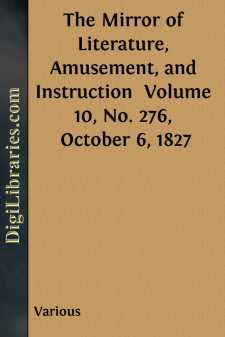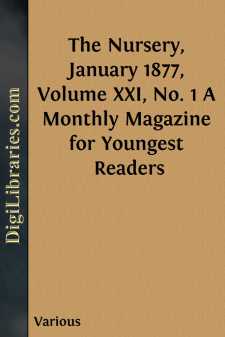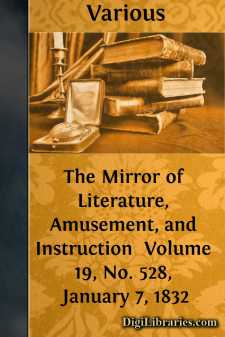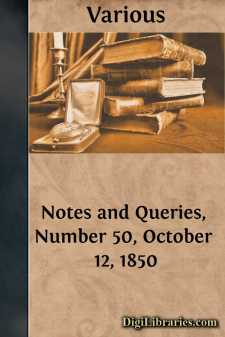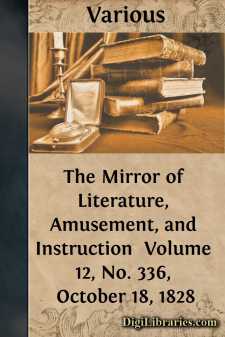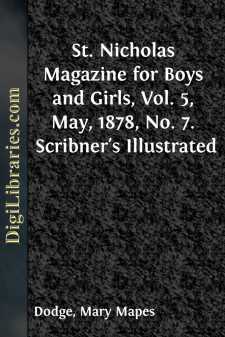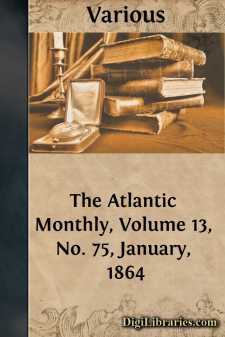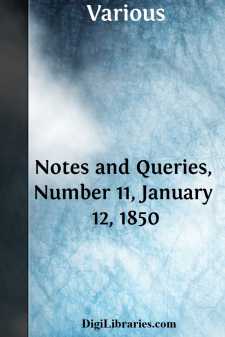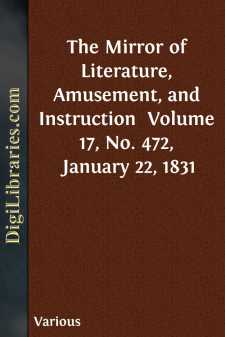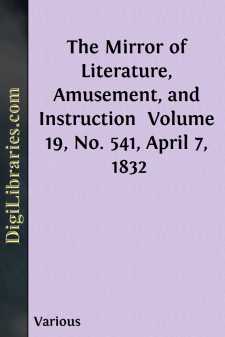Periodicals
- Art 27
- Children's periodicals 59
- Entertainment 5
- Food/Wine 2
- Games/Humor 455
- General
- Health 1
- History 53
- House/Home 1
- Regional 62
- Science/Nature 118
- Transportation 10
General Books
Sort by:
by:
Various
BRISTOL CATHEDRAL. There is given Unto the things of earth, which Time hath bent, A spirit's feelings, and where he hath leant His hand, but broke his scythe, there is a power And magic in the ruin'd battlement For which the palace of the present hour Must yield its pomp, and wait till ages are its dower. BYRON. The cathedral of Bristol is one of the most interesting relics of monastic...
more...
by:
Various
WORK AND PLAY. O you want your sidewalk shovelled?" This was the question asked of Mr. Prim, as he sat reading his newspaper, one New Year's morning. The question came through a servant who had just answered the door-bell. Mr. Prim looked out of the window. The snow was still falling. So he sent out word, "No shovelling wanted till the storm's over," and went on with his...
more...
by:
Various
SURREY ZOOLOGICAL GARDENS. In our volume, just completed, we noticed the origin of this Establishment; and the annexed engravings report favourably of its progress, They represent Two of the Entrance Lodges. Another rustic building, the appropriation of which is not yet decided. And a glazed circular building intended as a Refreshment room, but at present occupied by tropical birds, &c. All three...
more...
by:
Various
NOTES. A NOTE ON "SMALL WORDS." "And ten small words creep on in one dull line." Most ingenious! most felicitous! but let no man despise little words, despite of the little man of Twickenham. He himself knew better, but there was no resisting the temptation of such a line as that. Small words he says, in plain prosaic criticism, are generally "stiff and languishing, but they may be...
more...
by:
Various
Richmond Palace Richmond has comparatively but few antiquarian or poetical visiters, notwithstanding all its associations with the ancient splendour of the English court, and the hallowed names of Pope and Thomson. Maurice sings, To thy sequester'd bow'rs and wooded height, That ever yield my soul renew'd delight, Richmond, I fly! with all thy beauties fir'd, By raptur'd poets...
more...
by:
Mary Mapes Dodge
HOW MANDY WENT ROWING WITH THE "CAP'N."BY MARY HALLOCK FOOTE. It was the month of May—the season of fresh shad and apple-blossoms on the Hudson River. "Bub" and "Mandy" Lewis knew more about the shad than they did about the apple-blossoms, for their father was a fisherman, and they lived in a little house built on a steep bank between the road above and the river below....
more...
by:
Various
GOVERNOR JOHN WINTHROP IN OLD ENGLAND. Our magazine was introduced to the world bearing on the cover of its first number a vignette of the portraiture of the ever honored and revered John Winthrop, first Governor of the Colony of Massachusetts Bay. The effigies expressed a countenance, features, and a tone of character in beautiful harmony with all that we know of the man, all that he was and did....
more...
by:
Various
SIR EDWARD DERING'S HOUSEHOLD BOOK, A.D. 1648-52. About ten years since, I remember seeing, in the hands of a London bookseller, a curious MS. purporting to be the "Household Book of Receipts and Expences of Sir Edward Dering, Bart., of Surrenden Dering, Kent, from Lady-Day, 1648, to April, 1652." It was a think folio, in the original binding, entirely in the hand-writing of the...
more...
by:
Various
CHRIST CHURCH, DONCASTER. (From the Gentleman's Magazine.) The town of Doncaster has been long celebrated for its beauty and cleanliness, for its striking approach from the south, its magnificent Grand Stand, and celebrated Race Course, its public buildings, its venerable Gothic Church, and stately tower; and latterly, by the erection of a beautiful Gothic Church, with an elegant spire, giving an...
more...
by:
Various
THE LOWTHER ARCADE. In No. 514 of The Mirror we explained the situation of the Lowther Arcade. We may here observe that this covered way or arcade intersects the insulated triangle of buildings lately completed in the Strand, the principal façade of which is designated West Strand. The Engraving represents the interior of the Arcade, similar in its use to the Burlington Arcade, and, although wider and...
more...


